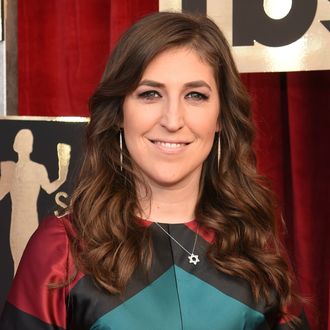
“I have always had an uncomfortable relationship with being employed in an industry that profits on the objectification of women,” Mayim Bialik, who got her start as the titular adolescent star of the ’90s sitcom Blossom, wrote on Friday. Now, three decades into her acting career, the fallout from Harvey Weinstein’s ongoing sexual harassment and assault scandal inspired the Big Bang Theory actress to reflect on feminism, objectification, and the hidden benefits of being an “average-looking” woman in a beauty-obsessed industry — benefits which, according to Bialik, include not being targeted by alleged predators like Weinstein.
“As a ‘nontraditional’-looking woman, I came back to an industry that had me auditioning for the ‘frumpy friend’ or the ‘zaftig secretary,’ though I eventually landed a role that has earned me four Emmy nominations,” Bialik writes in a New York Times opinion piece about her decision to return to acting after pursuing a doctorate degree in neuroscience. “And yet I have also experienced the upside of not being a ‘perfect ten.’ As a proud feminist with little desire to diet, get plastic surgery or hire a personal trainer, I have almost no personal experience with men asking me to meetings in their hotel rooms. Those of us in Hollywood who don’t represent an impossible standard of beauty have the ‘luxury’ of being overlooked and, in many cases, ignored by men in power unless we can make them money.”
The actress, who once contemplated getting plastic surgery to look more like her sitcom peer The Wonder Years’ Danica McKellar, then goes on to detail the rules she follows with regards to expressing her own sexuality: “I have decided that my sexual self is best reserved for private situations with those I am most intimate with. I dress modestly. I don’t act flirtatiously with men as a policy.” Bialik acknowledges that some women might not agree that moderating their personal behavior is the right path toward ending sexual harassment and assault, and there is little that suggests any of the misconduct allegedly committed by Harvey Weinstein could have been avoided by adherence to her suggested guidelines. “I am entirely aware that these types of choices might feel oppressive to many young feminists,” writes Bialik, “In a perfect world, women should be free to act however they want. But our world isn’t perfect. Nothing — absolutely nothing — excuses men for assaulting or abusing women. But we can’t be naïve about the culture we live in.”




